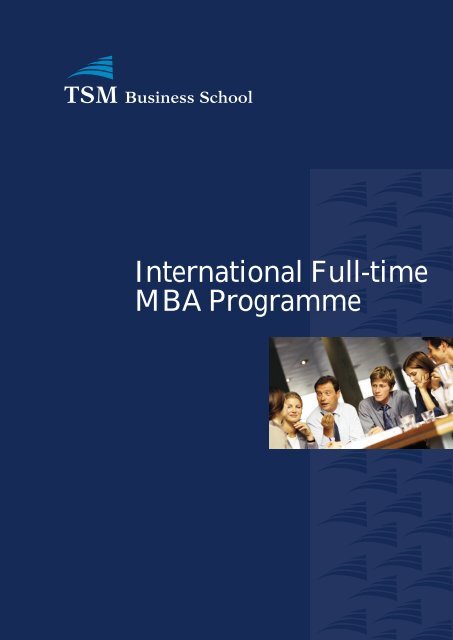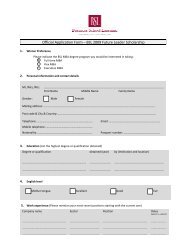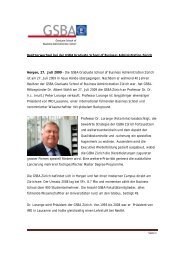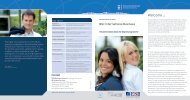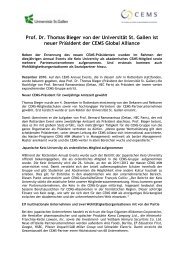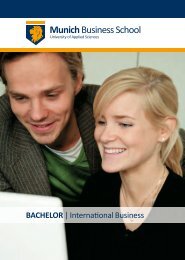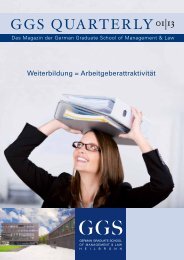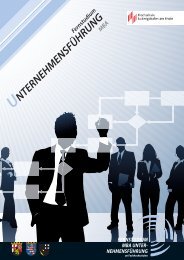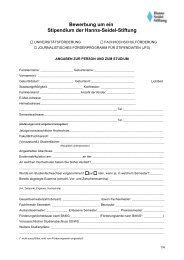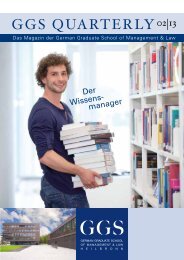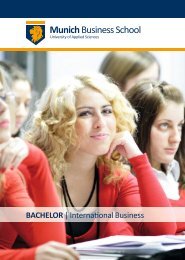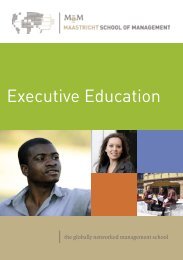3213 Brochure Int. Full-time 4 - WiWi-Online
3213 Brochure Int. Full-time 4 - WiWi-Online
3213 Brochure Int. Full-time 4 - WiWi-Online
You also want an ePaper? Increase the reach of your titles
YUMPU automatically turns print PDFs into web optimized ePapers that Google loves.
<strong>Int</strong>ernational <strong>Full</strong>-<strong>time</strong><br />
MBA Programme
TSM Business School: development beyond learning<br />
TSM Business School, founded in the city of Enschede in The Netherlands, is the international graduate school<br />
of the University of Twente. We offer professionals, the corporate sector and government tailor-made support in<br />
acquiring all competencies required for effective leadership and well-founded managerial conduct.<br />
Our programmes inspire professionals to increase their competence.<br />
The MBA programmes of TSM Business School have a strong emphasis on technology management, entrepreneurship,<br />
innovation and strategy. Our co-operation with prominent technology-oriented organisations makes<br />
our MBA ideal for professionals in technology-related companies. A focus on personal growth gives participants<br />
the opportunity to improve their management skills.<br />
The programmes of TSM Business School are<br />
based on a philosophy in which competency<br />
development relies on three strongly interconnected<br />
pillars:<br />
• Cognitive development - broadening one's views<br />
and gaining an in-depth understanding<br />
of the knowledge that is required to be<br />
able to perform in the manner desired.<br />
• Personal development - training skills,<br />
supported by coaching, reflection, intervision<br />
and assessments.<br />
• Professional development - putting the newly<br />
acquired knowledge into practice, aimed at a<br />
specific corporate context.<br />
Contents<br />
Page<br />
From Engineer to Manager . . . . . . . . . . . . . . . . .1<br />
The Programme . . . . . . . . . . . . . . . . . . . . . . . . . . .2<br />
Programme components . . . . . . . . . . . . . . . . . . .3<br />
<strong>Int</strong>ernational orientation . . . . . . . . . . . . . . . . . . .7<br />
Studying in the Netherlands . . . . . . . . . . . . . . . .7<br />
Studying at TSM Business School . . . . . . . . . . .8<br />
On the basis of these pillars this knowledge, these<br />
skills and their application are interwoven into<br />
a synergetic whole. The participants learn to<br />
recognise and utilise all aspects of their potential.<br />
This enables them to transform into the effective<br />
manager they want to be, or into the type of<br />
manager required by their organisations.<br />
Registration and information . . . . . . . . . . . . . . .9<br />
Alumni Association CoMBAtif . . . . . . . . . . . . . .9<br />
The programmes of TSM Business School can<br />
be subdivided into three main categories:<br />
- MBA programmes<br />
- Professional Development Programmes<br />
- In Company Programmes<br />
Over the years TSM Business School has acquired<br />
a strong reputation, both nationally and internationally,<br />
as an innovative institute for postgraduate<br />
management programmes.
From Professional to Manager<br />
The demand for managers with a technical and professional background is now<br />
beyond question. Today’s companies have to operate in a market that is becoming<br />
ever more complex and in a world where the speed of technological development is<br />
growing exponentially. As a manager you need all the competencies (sufficient skills<br />
and know-how) to handle the processes that are intrinsic to a technically oriented<br />
environment.<br />
The <strong>Int</strong>ernational <strong>Full</strong>-<strong>time</strong> MBA Programme at<br />
TSM Business School is a management development<br />
programme with an international orientation,<br />
designed for university and higher vocational<br />
graduates who have a degree in a technologyrelated<br />
subject and/or a couple of years of work<br />
experience in a technically oriented environment.<br />
The <strong>Full</strong>-<strong>time</strong> MBA Programme extends over<br />
an academic year consisting of three trimesters<br />
followed by a business assignment lasting six<br />
months. Groups are deliberately kept small,<br />
to enhance interaction among participants and<br />
between participants and lecturers.<br />
In this intensive and challenging programme it<br />
is results that count: results in terms of personal<br />
development; results in the individual and group<br />
assignments; and results in linking theory and<br />
practice. Through case studies, computer simulations,<br />
a high-tech marketing project and the<br />
business assignment, participants put into practice<br />
what they have learned. The end result is an<br />
MBA that prepares students to move quickly into<br />
jobs with broad management perspectives.<br />
finance, law, and of organisation and innovation<br />
concepts, prepares managers with a strong foundation<br />
for making the right decisions, and for<br />
integrating new developments effectively within<br />
the company.<br />
2. The learning manager<br />
As knowledge becomes obsolete in a fast changing<br />
environment, managers especially have to embrace<br />
and develop life-long-learning capabilities,<br />
-not only for themselves, but also for their teams<br />
and their organisations.<br />
3. The skilled manager<br />
Not everyone has an instinct for management.<br />
Therefore in the early part of the programme<br />
participants gain insights into their managerial<br />
strengths and weaknesses. With these insights a<br />
‘skills programme’ tailors an individual study and<br />
Four characteristics of an effective manager are<br />
made explicit in the <strong>Full</strong>-<strong>time</strong> MBA Programme.<br />
1. The competent manager<br />
To manage all kinds of new developments effectively,<br />
a pure technical background is no longer<br />
sufficient. An integrated knowledge of a wide<br />
range of disciplines such as strategy, marketing,<br />
1
Phase 2<br />
In the second trimester, you acquire more advanced<br />
knowledge, applying it in structured<br />
situations. Working in small groups, you perform<br />
casework, usually addressing problems within<br />
technology-oriented companies. The teaching<br />
focus is on teambuilding through the integration<br />
of knowledge you gain in workshops, computer<br />
simulations, skills training and group exercises.<br />
personal development plan for each individual<br />
person. Among the management aptitudes that<br />
are developed, special attention is paid to leadership,<br />
conflict resolution, communication and<br />
negotiation skills.<br />
4. The enterprising manager<br />
Effective managers take responsibility for their<br />
own actions, for their team’s actions, and for the<br />
way the available resources are employed. They<br />
also bear responsibility for broader aspects,<br />
such as the environment. Entrepreneurship and<br />
responsibility go hand in hand. For example,<br />
during the theoretical year participants will be<br />
divided into different teams, and each team will<br />
have its own goal and responsibility.<br />
THE PROGRAMME<br />
The <strong>Full</strong>-<strong>time</strong> MBA Programme lays strong<br />
emphasis on three main issues: management<br />
development, personal development and career<br />
development.<br />
MANAGEMENT DEVELOPMENT<br />
The programme develops your expertise in four<br />
distinct phases:<br />
Phase 1<br />
In the first trimester, you acquire knowledge in<br />
key managerial areas, - significant to effective<br />
business management. These areas include<br />
Managerial economics, Marketing, Project<br />
management, <strong>Int</strong>ernational business law,<br />
Organisational theory and Production management.<br />
Phase 3<br />
In the third trimester you test your ability to<br />
manage. By simultaneously balancing a number<br />
of demands, you learn to manage yourself and<br />
your academic performance, while also learning<br />
to manage others - often under pressure! As your<br />
grasp of the core subjects deepens, you are given<br />
further opportunities to apply your knowledge in<br />
group assignments and in the unique high-tech<br />
marketing project where you work closely with<br />
the managers of a participating company.<br />
Phase 4<br />
In the fourth and final stage you put what you<br />
have learned into practice: -moving to a real<br />
working environment at an organisation of<br />
your own choice. By engaging on a ‘live’ business<br />
assignment, you will get the opportunity to<br />
demonstrate your ability to deal with real management<br />
challenges.<br />
PERSONAL DEVELOPMENT<br />
The essence of management is “getting things<br />
done through people”. As a future manager, you<br />
will provide leadership, motivation, and guidance.<br />
And it is these skills that will prove crucial to your<br />
success.<br />
The programme starts with an assessment of your<br />
personal strengths and weaknesses. These include<br />
factors such as the ability to lead, persuasiveness,<br />
and empathy. The assessment serves as the basis<br />
for drawing up a personal development plan.<br />
This in turn provides guidelines for the development<br />
of skills throughout the entire <strong>Full</strong>-<strong>time</strong><br />
MBA Programme.<br />
2
Your personal development plan will be supported<br />
by training in a range of skills. In phase one, the<br />
skills training develops your personal effectiveness:<br />
effective presentations, <strong>time</strong> management<br />
and written communication. In the second phase,<br />
more attention is paid to developing interpersonal<br />
effectiveness: participating in and/or chairing<br />
meetings, communication skills, stress management,<br />
as well as general ‘people’ management<br />
skills. In the third and final phase attention is<br />
paid to leadership effectiveness: negotiation skills,<br />
conflict management and leadership skills.<br />
CAREER DEVELOPMENT<br />
Career development involves a variety of methods<br />
that are applied throughout the academic year.<br />
In particular retreats are organised where fellow<br />
students conduct intensive personal evaluations.<br />
Furthermore attention is paid to career enhancement,<br />
including job application skills and networking<br />
skills. Additionally, informal social events<br />
are organised when participants can meet experts<br />
from industry and executive search agencies.<br />
Finally, there are frequent company visits that<br />
provide a glimpse inside many different working<br />
environments.<br />
To provide continuous guidance, each participant<br />
is teamed with a personal coach who helps that<br />
person monitor and evaluate their progress and<br />
career development against individual personal<br />
development plans.<br />
PROGRAMME COMPONENTS<br />
TECHNOLOGY AND ORGANISATION<br />
<strong>Int</strong>egrating the latest technology into contemporary<br />
organisations requires an understanding<br />
of both of these key areas. Three courses are<br />
integrated under this theme to show the essential<br />
interaction between them:<br />
Organisation Theory<br />
In order for you to gain knowledge of specific<br />
organisational structures, as well as keep your<br />
bearings within a variety of organisational settings,<br />
this course provides a thorough grounding<br />
in the principles of organisational theory. A computer<br />
assisted case allows you to apply what you<br />
have learned in a virtual shop-floor environment.<br />
Operations Management & Logistics<br />
Fine-tuning an organisation to optimal levels of<br />
quality, delivery on <strong>time</strong>, and efficient production<br />
and operation methods is essential for survival.<br />
In this course, you will get the necessary basics in<br />
production and operations concepts. Topics included<br />
are product design and process selection,<br />
CAD/CAM systems, Total Quality Management<br />
(TQM), Just-in-Time systems, project planning<br />
and control, automation, and work measurement.<br />
You will also learn how to apply planning and to<br />
appreciate the differences between operational<br />
systems in manufacturing, service, and distribution<br />
organisations. The logistics typologies of<br />
production situations, capacity management,<br />
Erik Smakman<br />
My Name is Erik Smakman.<br />
I graduated in 1993 as a Chemical<br />
Engineer from Delft University of<br />
Technology (Netherlands). During<br />
my first professional year as a<br />
process engineer at a protein<br />
processing company, I realised<br />
that the major improvements in the manufacturing process would be<br />
achieved by changes in the organisation. I also noticed that actually,<br />
I liked that better than improving the technology itself.<br />
I felt however that I needed more knowledge and skills in business.<br />
Therefore, I considered doing an MBA. I decided to join TSM Business<br />
School in 1996 with a strong motivation:<br />
●<br />
●<br />
●<br />
the small group size, that stimulates interaction with teaching staff;<br />
the balanced programme of both knowledge and skills, provided by<br />
academic staff;<br />
the international setting that helps to get insight into other cultures<br />
During my <strong>time</strong> at TSM, I relished living together in one house with my<br />
colleagues from other countries. It broadened my perspectives in many<br />
ways.<br />
I am currently working as Strategy Consultant at PwC Consulting,<br />
a business of PricewaterhouseCoopers. TSM gave me the business<br />
insights and tools that sharpened my thinking and benefit me daily.<br />
3
inventory and supply chain planning and control,<br />
and Manufacture Resource Planning (MRP) are<br />
all discussed.<br />
MANAGERIAL ECONOMICS<br />
The competence of MBA graduates in the management<br />
of cash flows and the accompanying flow of<br />
information has a direct influence on the financial<br />
condition and performance of the firm. This<br />
managerial economics course comprises three<br />
highly interrelated, yet distinct modules:<br />
Management Accounting<br />
The focus here is on internal cost analysis and<br />
the process of providing managers with the right<br />
information. Subjects include: Activity Based<br />
Costing, cost control, and performance measurement.<br />
Financial Accounting<br />
This discipline provides parties external to the<br />
firm (such as accountants, investors and the<br />
general public) with information on corporate<br />
financial performance. Subjects include: annual<br />
reports and cash flow statements, <strong>Int</strong>ernational<br />
Accounting Standards, income smoothing, and<br />
the key role of the Certified Public Accountant.<br />
Corporate Finance<br />
Decisions made by management to support investment<br />
and financing strategies are presented in a<br />
natural combination of insights derived from<br />
management accounting and financial accounting.<br />
Subjects include: business valuation,<br />
capital budgeting, financing strategies, and<br />
creditworthiness.<br />
MARKETING MANAGEMENT<br />
Today’s companies need to urgently rethink their<br />
business missions and marketing strategies.<br />
Especially with the increasingly rapid advance<br />
of technology and its influence on the course of<br />
corporate developments, businesses have a need<br />
for managers with an understanding of the principles<br />
of both marketing and today’s technology.<br />
Therefore, we devote attention to the following<br />
elements:<br />
Marketing for<br />
Technology-Oriented Organisations<br />
The essential elements that distinguish marketing<br />
in technology-based companies are analysed.<br />
The main topics are the marketing process,<br />
systems and strategies, management systems-,<br />
and organisation. Special attention is paid to<br />
the influence technological developments are<br />
expected to have on the future of marketing and<br />
marketing management.<br />
High-Tech Marketing<br />
All students are involved in a High-Tech<br />
Marketing Project within a carefully selected<br />
company. This project is carried out by a team<br />
consisting of <strong>Full</strong>-<strong>time</strong> MBA students cooperating<br />
with marketing, R&D, production and/or sales<br />
management staff from companies who have<br />
competed to participate. Akzo-Nobel, Philips,<br />
Fokker Space and Systems, Port of Rotterdam,<br />
KPN, Heineken, Gist Brocades, AT&T and<br />
Unilever are among those that have participated<br />
in recent years.<br />
HUMAN RESOURCE MANAGEMENT<br />
The most successful managers are those who<br />
realise the value of people, and understand the<br />
significance of managing this most valuable of<br />
assets wisely. The following two courses emphasize<br />
this importance.<br />
Organisational Behaviour<br />
Some of the questions examined during the<br />
course are: what is the influence of learning,<br />
reinforcement-, and motivation on effective<br />
work behaviour; how do conflicts arise and in<br />
what ways can we solve them; and in what<br />
4
ways do groups influence individual behaviour<br />
and the organisation? As the MBA class is itself<br />
an organisational entity, frequently the techniques<br />
studied in class are applied to the group process.<br />
Human Resource Management<br />
In close combination with the theory learned<br />
in the previous module, contemporary issues<br />
are integrated with classic studies of personnel<br />
management. Such subjects as human resource<br />
management and labour, women's resource<br />
management, work and job design, and worker<br />
influence are among some of the issues analysed<br />
and discussed in an open and free exchange of<br />
views.<br />
STRATEGIC MANAGEMENT<br />
This module will introduce the students to the<br />
discipline of strategic management. The ideas of<br />
major schools of thought in the discipline will be<br />
discussed, and students will learn to apply the<br />
ideas and tools developed by these schools to the<br />
analysis of firms and industries. Themes are: the<br />
content, context and process of strategy, sources<br />
of competitive advantage, industry analysis,<br />
the analysis of core competencies, and strategic<br />
planning and strategy formation.<br />
Strategic Purchasing and Supply Chain<br />
Management<br />
During the past few years purchasing and supply<br />
management has changed considerably in many<br />
companies. This is reflected in the increased<br />
attention this discipline is receiving from business<br />
management. An effectively and efficiently operating<br />
purchasing and supply function can make<br />
an important contribution to company results.<br />
Subjects include the role of purchasing in the supply<br />
chain, the sourcing process, purchasing and business<br />
strategy and supply chain management.<br />
ESSENTIAL DISCIPLINES<br />
The following courses are designed to provide<br />
you with additional tools - ancillary to the core<br />
subjects - which will help you to become a more<br />
effective manager:<br />
Information Technology<br />
The ability to apply information based on reliable<br />
data and to make cogent strategic decisions about<br />
the company is one of the most valuable talents a<br />
manager can possess. The themes in this module<br />
are: the relationship between ICT and business<br />
strategy, the impact of ICT on business processes,<br />
investment decisions on ICT systems and solutions,<br />
the management of ICT implementation projects<br />
and the management and control of ICT systems.<br />
Project Management<br />
Participants will be introduced to the model of<br />
Project Management and the associated management<br />
control processes. The module includes a<br />
hands-on exercise in small teams exploring project<br />
management issues as well as enhancing group<br />
process skills.<br />
Daniela Vatajelu<br />
I am Daniela Vatajelu and I am<br />
Romanian. Graduated with a M.Sc.<br />
in Chemical Engineering in 1993,<br />
I started working for a Romanian<br />
Scientific Institute, where I managed<br />
R&D projects for Chemical<br />
Companies in Romania. As my<br />
country was undergoing a period of major economic transformation,<br />
I realized I wanted to learn more about business.<br />
Doing an MBA at TSM Business School appealed to me as they were<br />
offering a broad academic program in which one could gain business<br />
knowledge and apply it immediately in practice in various in-company<br />
projects.<br />
I joined TSM in 1996 and got very excited about being part of an international<br />
group of ambitious students, all aiming to make the most out of<br />
the program offered by TSM.<br />
I feel that the knowledge and skills acquired at TSM have equipped me<br />
with the insights required to be successful in business.<br />
Currently I am working as an Economist in one of the Finance, Strategy<br />
and Planning Groups of Shell. I am glad to acknowledge that what I<br />
learned at TSM helps me make a difference every day.<br />
5
fundamental national differences in business law.<br />
Particularly in the areas of import/export regulations,<br />
tax structures, labour issues, and legislation,<br />
as they pertain to trade and international competition.<br />
Business Values and Ethics<br />
In everyday business, managers are confronted<br />
with a variety of issues that, alongside such<br />
conventional business-oriented considerations<br />
as return on investment and efficiency, require<br />
us to reflect on moral and ethical ramifications.<br />
The objectives of this module are to impart the<br />
reasoning and analytical skills required to examine<br />
ethical issues, to identify the moral issues<br />
involved in management, and to provide an understanding<br />
of the social and physical environments<br />
within which moral issues arise in business.<br />
Organisation of Innovation Processes<br />
The recognition of the value of innovation and<br />
the ability of an organisation to incorporate innovation<br />
processes is essential. This course<br />
trains you in techniques for inspiring innovative<br />
thinking, harnessing creative energy, and putting<br />
these processes into practice. Furthermore, you<br />
will learn how to recognise the minimum conditions<br />
for innovation and how to create an environment<br />
conducive to innovative thinking.<br />
Planning and Assessment<br />
of Management Research<br />
Quantitative research methods are geared to<br />
gathering information on which to base future<br />
decisions. Qualitative methods concentrate on the<br />
subjective factors that influence this data. In this<br />
course, a balance is struck between the quantitative<br />
and the qualitative, with the recognition that<br />
political and ethical factors can affect the objectivity<br />
and accessibility of research in general.<br />
<strong>Int</strong>ernational and Comparative Business Law<br />
Looking at the globalisation of today’s trade<br />
and businesses, it is essential to understand<br />
Entrepreneurship<br />
This module is designed to give participants a<br />
broad view of entrepreneurship and, in particular,<br />
enterprising behaviour. It provides insights into<br />
the importance of this concept in the light of a<br />
rapidly changing world and the new/evolving role<br />
of management. This further provides a useful<br />
platform to study the development of small independent<br />
businesses. In this respect students will<br />
be introduced to important thresholds: the ‘Start-<br />
Up’, ‘Survival’, and ‘Growth’ phases in the development<br />
of small businesses. Finally students will be<br />
acquainted with the concept of <strong>Int</strong>rapreneurship,<br />
i.e., entrepreneurial behaviour of an employee in<br />
an established organisation.<br />
<strong>Int</strong>ernational Cross-Cultural Management<br />
In this course the internationalisation process of<br />
businesses (such as international joint ventures<br />
and technology transfer) and differences between<br />
western and non-western countries with regard<br />
to business are examined. External differences,<br />
such as company environment and bureaucracy<br />
are juxtaposed with internal differences, including<br />
styles of business management, methods and techniques<br />
for analysis as well as ways of improving<br />
operations. To enable participants to manage<br />
across borders successfully, special attention is<br />
paid to intercultural management.<br />
6
Backgrounds of participants<br />
on recent programmes<br />
other business schools in the United States,<br />
including Georgia Institute of Technology<br />
(Georgia Tech) and Pepperdine University (USA).<br />
Mechanical Engineering<br />
Industrial engineering<br />
Aeronautic and Space Engineering<br />
Electrical Engineering<br />
Civil Engineering<br />
Chemical Engineering<br />
Construction Engineering<br />
Computer Science<br />
Agriculture<br />
Economics<br />
<strong>Int</strong>ernational business<br />
Current functions<br />
of MBA graduates<br />
Consultant<br />
Director/president/CEO/Managing director<br />
Engineer<br />
General manager<br />
Marketing manager<br />
Product manager<br />
Production manager<br />
Project manager<br />
Quality control<br />
Sales/area/account manager<br />
INTERNATIONAL<br />
ORIENTATION<br />
The participants in the <strong>Int</strong>ernational <strong>Full</strong>-<strong>time</strong><br />
MBA Programme come from all over the world,<br />
including among others: China, Colombia,<br />
Germany, Greece, Ghana, Honduras, Hungary,<br />
India, Indonesia, Pakistan, Romania, Russia,<br />
Tanzania, Trinidad, Turkey and Uruguay.<br />
Furthermore experienced TSM Business School<br />
lecturers and distinguished lecturers from universities<br />
in other countries maintain the international<br />
dimension of the programme and ensure that<br />
topics are dealt with in an international context.<br />
Additionally, we have student exchanges with<br />
STUDYING IN THE<br />
NETHERLANDS<br />
The Netherlands is situated in north-western<br />
Europe. Belgium and Germany lie along our<br />
southern and eastern borders, and the North<br />
Sea along our northern and western coasts.<br />
The Netherlands, bikes & books.<br />
By Fernando Meneses Alvarez -<br />
MBA (1998-2000)<br />
I am a Project Engineer for the number<br />
one world-wide supplier of integrated<br />
fuel systems. My responsibility<br />
is to start-up new factories and<br />
to launch new products in Mexico.<br />
I am involved in almost the whole process; from writing business plans to<br />
delivering complete fuel systems at customer assembly plants. Within the<br />
company, I have to work with people from many different countries. Due<br />
to the broad scope of my job I can use most of the subjects that were part<br />
of my studies at the <strong>Int</strong>ernational Master in Business Administration<br />
Programme (MBA) at TSM Business School..<br />
Before I joined the MBA course, I came into contact with the world of<br />
international business and discovered how interesting it was. I also found<br />
out that my knowledge and experience were not enough if I wanted to get<br />
into better and more challenging positions. So, I started my search for an<br />
<strong>Int</strong>ernational MBA programme. The programme at TSM Business School<br />
had just what I was looking for, its focus on the development of engineers<br />
to managers and the development of management aptitudes really attracted<br />
my attention. Further research on the country and culture increased<br />
my interest and I decided that TSM Business School was the best choice.<br />
The Netherlands, symbol of international business and global thinking<br />
was the perfect environment to obtain my Masters Degree.<br />
The Netherlands, symbol of mills, tulips, dams, books and bikes became<br />
my home for eighteen months.<br />
I graduated in 2000 and I remember the 18 months at TSM Business<br />
School as being the most wonderful and enriching experience I have<br />
ever had. I look forward to the future and see the path of success and<br />
great challenges.<br />
7
The country has a population of 16 million. The<br />
official language is Dutch, but nearly everyone<br />
speaks English as a second language. The<br />
Netherlands is the market leader in English study<br />
programmes on the European continent.<br />
The geographical location of the Netherlands<br />
makes the country an ideal gateway to Europe.<br />
<strong>Int</strong>ernational focus has brought the country a<br />
well-deserved reputation as a trading nation.<br />
Several multinationals, which began as Dutch<br />
companies and many foreign companies have<br />
their European headquarters in the Netherlands.<br />
Dutch industry has traditional strengths in chemicals,<br />
metallurgy, food production and food processing.<br />
In the fields of technology, research, science<br />
and education the country for many years has put<br />
a great effort into maintaining a strong position.<br />
The open attitude of the Dutch towards the rest of<br />
the world goes far beyond business. Dutch society<br />
is multicultural and modern. Many communities<br />
are fully integrated into society but at the same<br />
<strong>time</strong> are able to maintain their own values.<br />
Wherever you come from, you can rest assured<br />
that this safe, open society will provide you with a<br />
hospitable home during a memorable stay.<br />
Examples of practical<br />
assignment projects:<br />
• Proposal for Global Manufacturing and<br />
Distribution Strategy-Enzymes and<br />
Colours Quest <strong>Int</strong>ernational (Unilever).<br />
• Long - Term Product Planning for Automotive<br />
Exterior Body Panels GE Plastics.<br />
• The Demand for Virtual Private Networks<br />
in Multinational Corporations AT&T<br />
Network Systems.<br />
• Financial Opportunities for Yamal (Russia)<br />
- Europe Gas Pipeline Project Nacap,<br />
Netherlands.<br />
• Investment Opportunities for Technologyoriented<br />
Companies in Slovakia Slovak<br />
American Enterprise Fund.<br />
STUDYING AT TSM<br />
BUSINESS SCHOOL<br />
LOCATION AND FACILITIES<br />
TSM Business School is located on the Business<br />
& Science Park, adjoining the campus of the<br />
University of Twente, Enschede, the Netherlands.<br />
The <strong>Int</strong>ernational <strong>Full</strong>-<strong>time</strong> MBA Programme<br />
takes place at the campus of the University of<br />
Twente, which occupies a beautiful site amid the<br />
fields and woodlands of the former Drienerlo<br />
country estate. The UT campus offers extensive<br />
services. These include excellent sporting amenities,<br />
restaurants, pubs, accommodation for staff<br />
and students, a medical centre, a supermarket<br />
and an art and cultural centre.<br />
ADMISSION REQUIREMENTS<br />
To qualify for the <strong>Int</strong>ernational <strong>Full</strong>-<strong>time</strong> MBA<br />
Programme, you should meet the following criteria:<br />
• Engineering degree or a technically-oriented<br />
academic or higher vocational background<br />
• Preferably, you will also have three years<br />
working experience<br />
• Graduate Management Admission Test (GMAT)<br />
• Test of English as a Foreign Language (TOEFL):<br />
for non-native English speakers<br />
You will also have to successfully pass a selection<br />
interview, which tests:<br />
• your entrepreneurial attitude<br />
• the breadth of your knowledge and experience<br />
• your motivation,<br />
• your interpersonal skills and<br />
• your command of English<br />
SELECTION PROCEDURE<br />
Your application form, current CV, GMAT score,<br />
and a rigorous intake interview constitute the<br />
TSM Business School’s selection procedure.<br />
Candidates are accepted on the basis of the results<br />
of the interview, their background, work experience<br />
and potential for management. You will<br />
be notified within three weeks of application.<br />
8
THE HIGHLIGHTS OF OUR<br />
INTERNATIONAL FULL-TIME<br />
MBA PROGRAMME:<br />
• A balanced combination of management<br />
development, personal development and<br />
career development<br />
• Coverage of the main functional areas in<br />
management plus TSM’s core expertise in<br />
Management of Technology, Innovation,<br />
Entrepreneurship, Strategy, ICT and<br />
<strong>Int</strong>ernational Business<br />
• Case studies, peer evaluations and discussions<br />
with industry experts<br />
• The challenge of a demanding high-tech<br />
marketing project and a six month business<br />
assignment within a company of your choice<br />
• Invaluable experience working in an international<br />
group of students<br />
• Small groups of students which enhance<br />
interaction among participants and between<br />
participants and lecturers<br />
• Extensive services offered by the campus of the<br />
University of Twente<br />
ALUMNI ASSOCIATION<br />
COMBATIF<br />
CoMBAtif, established in 1988, is the alumni<br />
association of TSM Business School. The<br />
objective is to create success for the members<br />
out of a common background, through mutual<br />
contacts, and the development of managerial<br />
knowledge and skills. Furthermore CoMBAtif<br />
strives to enhance the quality and reputation<br />
of TSM Business School.<br />
This booklet profiles some of the graduates of the<br />
<strong>Int</strong>ernational <strong>Full</strong>-<strong>time</strong> MBA Programme over the<br />
past fifteen years. These graduates exemplify the<br />
necessary spirit of todays leaders all over the<br />
world. We are proud of what our alumni are<br />
accomplishing and we hope that the stories of our<br />
alumni will help future participants to make the<br />
right decision for an MBA programme which fits<br />
their background and future career aspirations.<br />
For more information, please look at<br />
www.masteryourcareer.com<br />
MASTER<br />
YOUR MANAGEMENT CAREER<br />
THE TSM INTERNATIONAL<br />
FULL-TIME MBA PROGRAMME ENDORSED:<br />
FROM HOLLAND TO HUNGARY,<br />
FROM UGANDA TO URUGUAY,<br />
FROM CHINA TO COLOMBIA,<br />
MASTER<br />
OUR MANAGEMENT CAREER<br />
THE TSM INTERNATIONAL<br />
FULL-TIME MBA PROGRAMME ENDORSED:<br />
FROM HOLLAND TO HUNGARY,<br />
FROM UGANDA TO URUGUAY,<br />
FROM CHINA TO COLOMBIA,<br />
FROM...<br />
FROM...<br />
REGISTRATION AND<br />
INFORMATION<br />
To obtain an application form, or for further information<br />
regarding the <strong>Int</strong>ernational <strong>Full</strong>-<strong>time</strong> MBA<br />
programme at TSM Business School, please look<br />
at www.tsm.nl or contact us at:<br />
TSM Business School<br />
P.O. Box 217<br />
7500 AE Enschede The Netherlands<br />
Telephone: +31 (0)53 489 8009<br />
Fax: +31 (0)53 489 4848<br />
mba@tsm.utwente.nl<br />
www.tsm.nl<br />
www.masteryourcareer.com<br />
9


